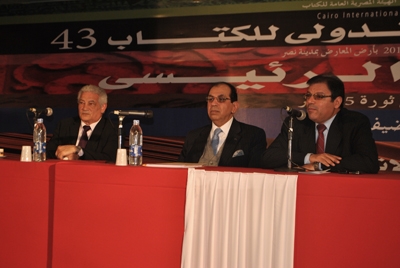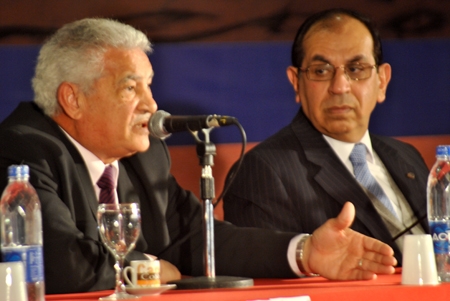On 3rd February 2012, Dr. Ayman Fouad gave a lecture at the Cairo Book Exhibition titled “Al-Maqrīzī and His book Al-Mawā‘ iż wa al-I‘tibār.” The lecture was chaired and moderated by Dr. Muhammad Hamza al-Haddad, Dean of the Antiquities Faculty at Cairo University and Dr. Qassim Abduh Qassim, Professor of History at Zaqaziq University.

Dr. Fouad began his lecture by highlighting the importance of the work of Al-Khitat in Egypt’s history, geography and its capital Cairo, in the Islamic period, using the original sources, this work is the only one to have provided a comprehensive presentation of Egypt’s history of the Islamic era and on the foundation and development of its cities under the reign of Islam and until the 9th century AH. Al-Khitat is today considered as an indispensable work for Islamic Egypt archeologists. Indeed, the work provides a detailed and precise descriptive list of the palaces, the mosques, the schools, the khāniqas (prayer halls), the districts, the public baths, public places and market places which existed in Egypt’s capital for nine centuries. This list rests essentially on Al-Maqrīzī’s personal observations and on sources that until now eluded us. In this way, al-Maqrīzī preserved for us writings of note by old authors whose works have disappeared
In addition, Al-Maqrīzī’s work is one of the sources of pride in Arab legacy. Indeed, it is the greatest and most comprehensive work ever written on an Islamic city. In this work, the author dealt in a wonderful way with the city’s historical, social organisation (‘umrān) and topographical aspects. It is a book that is different form Al-Khatīb al-Baghdādī’s The History of Baghdad just as it is different from Al-Hāfiz ibn ‘Assākir’s The History of Damascus.
The lecturer pointed out afterwards that Al-Maqrīzī focused mainly in his book on social organisation in the city of Cairo which had become the cultural and political centre of the Muslim World of his time. In this respect, Al-Maqrīzī gave a detailed account about everything related to Cairo-his birth place. He left no vestiges or institutions without describing them with impressive precision, going over the history of their building and all the changes that they went through in detail, relating in so doing, the biographies of the princes and the important figures who had built them or resided in them. Meanwhile, Al-Maqrīzī recorded the major events, traditions and drawings associated with such edifices and institutions. As Quatremère put it, “there is no other oriental city than Cairo to boast to have an author who produced a work similar to Al-Khitat from the point of view of the thoroughness and originality.”
Dr. Fouad went on to describe Al-Maqrīzī’s book as a leading and unprecedented work in its field, stating: “This book, is one which has broken ground in the history urbanism (‘umrān) and there is no older book. As for the book The History of Florence, the first to be written in the history of cities in Europe, it was written in 1840 CE, that is to say, some 400 years after the demise of Al-Maqrīzī.”
Furthermore, the lecturer dealt with the new edition of Al-Khitat, which the Al-Furqān Islamic Foundation plans to publish in the near future, describing it as an extended, revised version, properly edited, in which the previous errors were removed and which includes new sources and recent studies which came to light after the previous edition had been published. He also indicated that new photos of the buildings mentioned by Al-Maqrīzī were added. He pointed out that an outstanding feature of this edition is that it is based on new manuscript copies of the book: the most important one is the third volume, which was hand-written by the author and only recently discovered in 2010 in the Michigan University library in the USA; the other one is an old copy of the first volume, also hand-written by the author and located in the Faizallah library of Istanbul.

For his part, Dr. Qassim Abduh Qassim said that Al-Maqrīzī is indeed the only historian to deserve the title of the leader of historians. In fact people are all indebted to his knowledge and his works which are considered to be the best sources of Egypt’s Islamic history up to the advent of the Ottoman period. The lecturer explained in this respect that in spite of the fact that Al-Maqrīzī was of Lebanese origin, most of his books reflected his Egyptian personality. He went on to say that ‘Al-Maqrīzī was a researcher in sociology and as such he dealt with the religious sects, administration, churches, the Jews and their festivals, politics and statesmen, war and the military establishment… Al-Maqrīzī was said to be knowledgeable about all the existing cultures’.
Meanwhile, Dr. Muhammad Hamza al-Haddad pointed out that Al-Maqrīzī was born in one of Cairo’s districts and that his upbringing conditioned his thought and orientations. His books reflected the importance of archaeology, included poetical writings, were based on reports and observation, and demonstrate a great care in selecting data.
Comments and questions followed the lecture and centred around the confusion surrounding Al-Maqrīzī’s period. Dr. Ayman attempted to shed light on the realities of that period.

